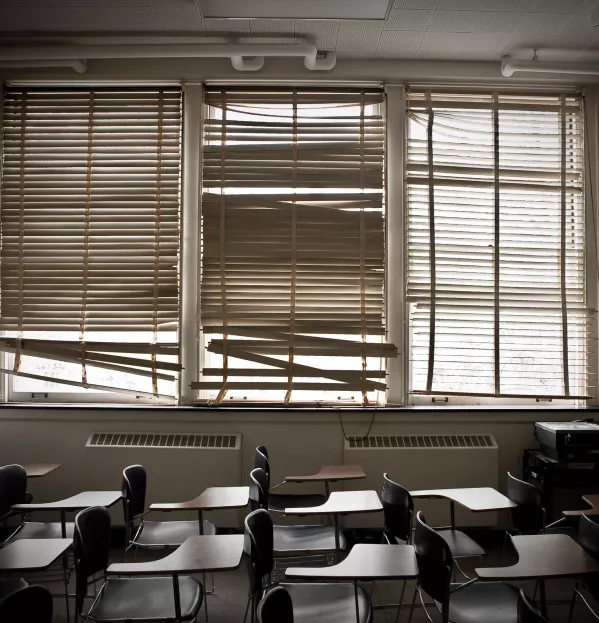‘Untouchables’: the schools that MATs won’t go near

Squeezed budgets, falling rolls, deprivation and crumbling buildings are leaving a growing number of schools facing “untouchable” status and rejection by risk-averse academy chains.
A TES investigation reveals that a recent change in the Department for Education’s approach to the contracts drawn up between multi-academy trusts (MATs) and schools, combined with a more cautious approach from the trusts, is deepening the problem.
Lawyers for MATs considering taking on extra schools say they are no longer able to amend clauses in funding agreements that would allow a trust to jettison a school in financial difficulties before it dragged the rest of the chain into insolvency.
The chief executive of one large academy trust, which was looking at incorporating a particular school, told TES: “We’re having to do much more due diligence.
“We have a school at the moment in such a state that we have had to go back to the regional schools commissioner to say, ‘This is not happening unless we get more money,’ and it is a very a big amount of money we’re asking for. They have a deficit budget. Although we have reserves, there is no way we would use that to bail out that school.”
Trusts ‘walk away’
TES analysis of the latest government figures shows 26 schools in England are still without confirmed sponsors more than a year after Ofsted branded them “inadequate” and ministers demanded they become academies.
Ofsted this week cited the “failure to secure a sponsor” in an inspection report for Baverstock Academy in Birmingham, judging the secondary “inadequate” in all areas.
It said: “The school is not financially sustainable. The lack of a sponsor and a significant fall in the number of pupils on roll mean the school has no capacity to continue in its current state.”
The DfE said there could be many reasons why schools rated as “inadequate” did not have sponsors, and argued they could not be labelled “untouchable”.
But solicitor Matthew Wolton said changes made by the department were fuelling the problem. “The DfE has recently changed the rules on funding agreements, which makes it more difficult for a MAT to stop operating a school if it threatens to bring the whole chain into insolvency,” he told TES.
Mr Wolton, who heads the public sector arm of law firm Clark Holt, said that he had previously been able to negotiate funding agreements that would allow MATs to let go of financially ruinous schools if they could bring down all the trust’s schools.
‘The school is left to carry on in special measures under a cloud’
“It’s important to note that this is not just a case of the MAT saying, ‘I want rid of it,’ and then it is jettisoned,” he said. “They have to show evidence that it will cause insolvency.”
But Mr Wolton has found in the past two months that the DfE is no longer allowing it.
The solicitor told TES that if local or central government were unable to provide schools with large amounts of money needed for major building work, then academy trusts would now “walk away”, unable to take the risk of accommodating them. “It is easy to see how this could quickly lead to a school becoming ‘untouchable’,” he said.
Poor Ofsted judgements also appear to be deterring MATs from taking on some schools. TES has heard from educationalists who have phoned local academy chains in a “mystery shopper”-style exercise. When they posed as a governor of a “good” school, the trusts were much more interested than if they said they were from a “requires improvement” school.
Tim Boyes, the chief executive of the Birmingham Education Partnership - a group of 300 schools - highlighted the plight of “deeply broken” untouchable schools at a meeting in London this month. “We are seeing protracted conversations with potential sponsors and then they walk away, and the school can carry on in special measures and under a cloud,” he said. “We end up with a system that’s allowing schools to sit with very high levels of need, serving very vulnerable communities, while there’s a stalemate sitting over the school. This is happening in different parts of the country.”
Mr Boyes was speaking at a meeting of an embryonic, yet to be named, body set up to act as a trade association for a growing number of geographically based school partnerships which want to put the “moral purpose” of helping struggling schools above the desire to climb school league tables.
‘It’s our moral purpose’
They say that the need has become more urgent with the retreat of local authorities and the proposed removal of the Education Services Grant that could further diminish councils’ capacity in August. Former Labour education secretary Baroness Morris, who chaired the event, said that the fate of untouchable schools was “the biggest argument for going beyond MATs”.
But the DfE said there was no evidence to support the claim that schools were untouchable. “Where a school is underperforming, regional schools commissioners can compel a governing body or local authority to take specified steps towards academy conversion,” a spokesperson said.
He added that the DfE gave sponsors grants that varied with the scale of the challenge.
You need a Tes subscription to read this article
Subscribe now to read this article and get other subscriber-only content:
- Unlimited access to all Tes magazine content
- Exclusive subscriber-only stories
- Award-winning email newsletters
Already a subscriber? Log in
You need a subscription to read this article
Subscribe now to read this article and get other subscriber-only content, including:
- Unlimited access to all Tes magazine content
- Exclusive subscriber-only stories
- Award-winning email newsletters